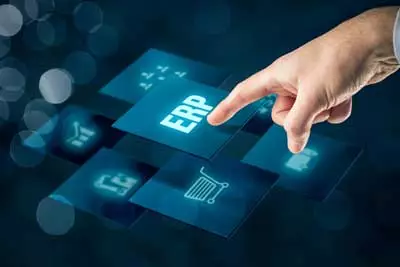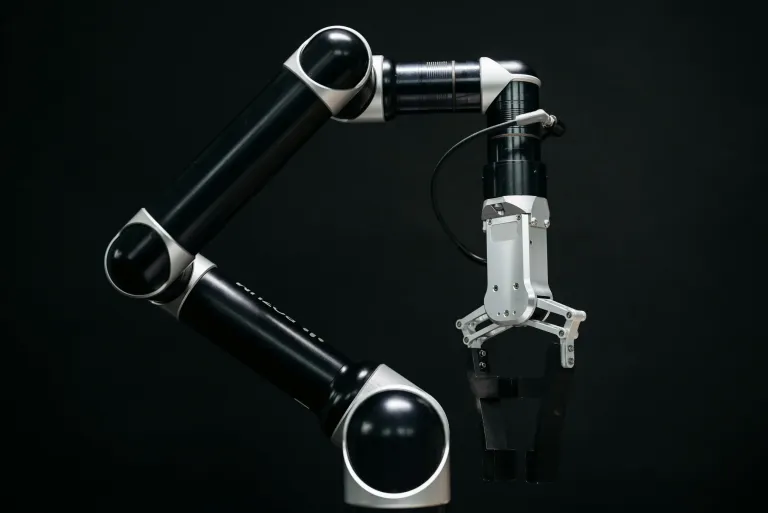
An Introduction to ERPs and ERP Mobility for Supply Chain Pros
As supply chains digitize to meet increasing needs for efficiency and speed, one of the core technologies behind these optimization efforts is enterprise resource planning software (or ERP technology). ERP software integrates the many aspects of supply chain operations into a single foundation. ERPs bring together planning, purchasing, finance, inventory, human resources and many other aspects of your business.
The ERP software market is set to generate $78.4 Billion by 2026. The industry is projected to steadily grow at the rate of 10.2% every year with the aerospace and defense industry expected to have the highest ERP adoption rate.
These numbers demonstrate that companies are beginning to realize the importance of enterprise resource planning systems in their bottom lines. Supply chain management (SCM) is one of the critical areas in an organization that needs to embrace these shifts to expedite operations and increase ROI.
In the following article, we are going to explore the essential points supply chain professionals like you need to know when it comes to ERP software.
Also Read: ERP Integration Plays Vital Part in Supply Chain Optimization »
Migration to Cloud: The Hot Trend
Many enterprises are either already in the process of moving to the cloud or planning to move their systems in the next five years.
Why are businesses moving to cloud ERP?
Companies using traditional premise ERP deployments are eyeing the cloud for simplification, scalability and ease of maintenance. Supply chains, in particular, have joined in the cloud-based ERP craze that is rapidly gaining momentum across a spectrum of industries. With added security, remote access and robust data recovery, cloud-based ERP is positioned to become the new status quo. But the technology isn’t fully developed yet.
Major ERP providers like Oracle and SAP are leading the effort. Touting their new cloud Infrastructure-as-a-Service (IaaS) as a way to simplify complex technical landscapes, they are increasing the bulk of their resources into developing these cloud-based ERP products. Legacy ERP products like JD Edwards, E-Business Suite, and older versions of SAP (pre-HANA) will be phased out of main support by 2025. RFgen experts expect other ERP providers to follow their lead.
According to the Accenture 2019 ERP Trends Report, 53% of companies would like to move their ERP systems to the cloud right away while 49% are strategizing to shift their resource planning systems to the cloud in 3-5 years’ time. Moving to the cloud creates a platform for standardization of the best practices and simplification of the ERP landscape. Most likely, multinational corporations will go for private cloud or private cloud with managed services to retain control of their operations.
For supply chain companies, the shift to the cloud ERP can be beneficial but is by no means a cure-all. Cloud-based IaaS models do not give users access to ERP core code, forcing your processes into pre-defined standardization. This effectively eliminates the ability to tailor your ERP environment to meet unique or complex needs. In SCM, processes are often unique and complex.
The ideal option here may be to adopt an on-premise (“on-prem”) ERP. Most ERPs offer on-premise deployments, such as Oracle SCM and SAP S/4HANA. On-premise ERP setups give users full ownership over their environment, including access to core. Another option is called hybrid ERP, a middle ground that incorporates both on-premise and cloud into a “hybrid” deployment model.
Also Read: Cloud-based or On-Premise ERP: Making the Right Choice for Your Business »
What is ERP Mobility?
An ERP system for supply chain management is essential to unifying disparate systems and removing inefficiencies and bottlenecks common in manual workflows. Enterprise mobility specific to ERP software is known as ERP mobility.
ERP mobility extends the power of your system by enabling workers to access, update and input new data at the point-of-work using wireless handheld devices. This not only eliminates the need to commute to a fixed workstation computer but eliminates manual data entry and paper processes as well, flushing out opportunities for human error. Integrating enterprise mobility into your ERP environment accelerates performance, productivity, flexibility, visibility and boosts ROI.
For manufacturers, distribution and transportation businesses looking to counter market pressures like tariffs and labor challenges, these efficiency gains are important to reducing overhead spends. Mobile ERP software can help supply chain organizations augment workforces and drive customer satisfaction as well.
Also Read: How Extending ERP Data to Mobile Devices Pays Off Across the Supply Chain »
When it comes to mobilizing ERPs in the supply chain, look to a solution that is purpose-built for the complexities of inventory, production and warehousing. A more generalized mobile app platform may function well for managing human resources. But trying to leverage that same broad approach to complex supply chain workflows, especially at the line-level, and you may find yourself short on capabilities.
SCM enterprise mobility solutions like the Mobile Unity Platform™ and RFgen Mobile Development Studio help companies get more for their ERP investments. Some of the benefits include:
- 24/7 visibility and control in real-time
- Automated data collection using mobile barcoding
- Increased worker productivity and efficiency
- 99% and higher inventory data accuracy
RFgen mobile solutions offer validated integration with the cloud, hybrid and on-premise ERPs. Whether you are using one ERP, multi-tiered ERP systems, or several different ERP systems across your enterprise, RFgen can integrate with your business systems to create a system of real-time, bi-directional data exchange.
RELATED: ERP Success Depends on Mobile Application Development »
Some of the major ERP systems used by today’s supply chain companies include:
- Oracle SCM Cloud
- Oracle JD Edwards
- Oracle’s Enterprise E-Business Suite
- SAP
- SAP S/4HANA
- SAP BusinessOne
- Deltek Costpoint
- Microsoft Dynamics
All of these ERPs can be mobilized.
Which Industries Use ERP-SCM Mobility?
ERP systems are complete, integrated systems that streamline workflows in production-based organizations by aligning human resources, financial management, SCM, and manufacturing with accounting. If you need transparency or greater visibility into the production process, manufacturing ERPs are invaluable tools that allow you to track production processes, financials, and the movement of materials in one place. This makes ERPs essential for supply chain industries.
Any company that moves, stores, makes or sells inventory will benefit from ERP software, SCM solutions and ERP mobility.
Some examples include:
Aerospace & Defense
In the aerospace and defense industry, most components and parts in manufacturing processes must pass through a series of approvals and quality control. ERP tools serve to maintain standards and ensure smooth workflows by building checkpoints that ensure that components meet the required properties.
Companies in this industry require real-time communication and accurate allocation of resources at any given time. With advancing technologies such as ERP mobility, those in the industry can manage production, transport and inventory processes seamlessly using mobile devices while automating previously manual processes.
Automotive Manufacturing
In the automotive industry, various parts and components during production cycles require accurate tagging to help streamline workflows. Most automotive businesses are fast-tracking manufacturing processes in complex production cycles by replacing data entry at workstations with mobile barcoding and RFID systems that integrate seamlessly with cloud and mobile technologies.
Leaders in the automotive space, like Toyota, embrace a lean manufacturing process where production managers can view the entire production process in a single platform. Its SCM system utilizes ERP tools for real-time asset tracking, Just-In-Time (JIT) inventory management and waste reduction. Using mobile data collection, the company ensures high-quality inventory data is captured and validated before entering the production line, and then re-captured and re-validated as finished products.
Construction
If you are in the construction industry, you understand the challenge of managing large quantities of raw materials and equipment at multiple locations. ERPs and ERP mobility help track these materials as they arrive at your facilities and flow through the production process into final products, which are then stored and shipped to customers or construction sites. ERP solutions automate the repetitive, error-prone processes along the way, simplifying operations and increasing efficiency at every step.
Pharmaceuticals
For those in the “pharma” industry or pharmaceutical manufacturing, the importance of compliance and quality control cannot be understated. ERPs provide a dashboard-driven manufacturing process where you can manage every transaction and monitor operations. Cloud-based ERPs such as Oracle SCM Cloud and Deltek Costpoint provide the opportunity to track and monitor assets and transactions in your pharmaceutical company for maintenance as well. Extending your ERP’s power onto mobile devices with ERP mobility further drives efficiency, productivity and accuracy.
Non-Manufacturing Industries
Non-manufacturing businesses such as education, healthcare, and transportation and logistics can take advantage of ERP mobility to refine their back-end operations. Supply chain mobility solutions allow you to bring fragmented operations into a single solution through automation and real-time mobile technology.
Other industries such as oil and gas, electronics, high technology, chemicals, plastics, food and beverage, packaging, and distribution also need supply chain mobility in managing inventory and tracking movement of goods across the supply chain cycle. Regardless of industry, ERP mobility I an agile solution that enables your business to adapt to changes and support lean strategies.
Choosing an ERP and an ERP Mobility Solution
The supply chain industry is highly dependent on resource planning, making ERP software a necessity for doing business. But implementing an ERP system can take months and significant financial resources. Certain ERPs have advantages or are built with specific functionalities in mind. For example, Deltek Costpoint is ideal for government contractors, such as those in the aerospace and defense industry, while Oracle E-Business Suite (“EBS”) focuses on manufacturing.
Regardless of which ERP you choose, ERP mobility should be in the back of your mind. While it’s not advisable to implement a new ERP and mobility at the same time, introducing a mobility solution is a good post-implementation goal to have in your strategy.
Mobilizing your ERP system can unlock new levels of performance and flexibility. With mobility, ERP users stand to benefit from higher efficiency, increased performance and ROI, greater visibility of business operations and improved customer satisfaction.

Tomorrow’s Warehouse Today
Learn how implementing cutting-edge technologies can provide multiple points of operational efficiency.






